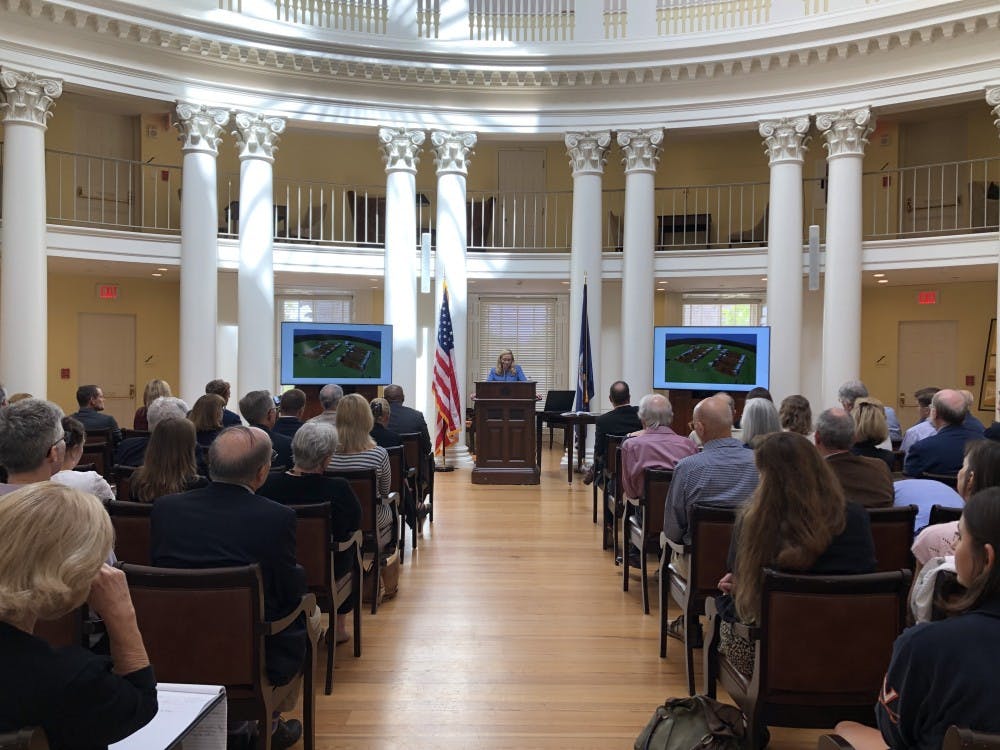The University of Virginia Press hosted a ceremony Thursday afternoon in the Rotunda Dome Room to commemorate its publication of “Educated in Tyranny: Slavery at Thomas Jefferson’s University” — a book about the history of slavery at the University and founder Thomas Jefferson’s involvement in bolstering pro-slavery, racist ideals.
The book was edited by Louis Nelson, University vice provost for academic outreach and professor of Architectural History, and Maurie McInnis, provost and executive vice president at the University of Texas at Austin. It features essays by Nelson, McInnis, James Zehmer, Benjamin Ford, Jessica Ellen Sewell, Andrew Scott Johnston, Thomas Howard, Alfred Brophy and Kirt von Daacke.
All seats in the Dome Room were filled for the ceremony. A reception held in the Colonnade Club afterwards was full, too, as guests stood in line to buy copies of the book and then obtain the editors’ signatures.
University President James Ryan opened the ceremony by thanking Nelson and McInnis.
He also thanked the book’s contributing authors, including Marcus Martin, former University vice president and chief officer for diversity and equity. He also recognized students part of the Jefferson’s University—Early Life project — an online database that focuses on the first half-century of the University — and the University Guide Service; those who pushed for the Memorial to Enslaved Laborers to be built; the President’s Commission on Slavery at the University, which is co-chaired by Kirt von Daacke, assistant dean and History professor, and Martin; and the President’s Commission on the University in the Age of Segregation, which is co-chaired by Andrea Douglas, executive director of the Jefferson School African American Heritage Center, and von Daacke.
“Being honest is not always easy, but it's necessary, and this is what's at the heart of educated interior,” Ryan said. “This is a book of truth-telling — a book that not only acknowledges slavery at university, which many have done, but details the brutality of slavery in the Academical Village.”
The book, which came out August 13, tells the stories of the slaves who built the University, with maps and photographs of artifacts accompanying the text.
“While U.Va. has long been celebrated as fulfilling Jefferson’s desire to educate citizens to lead and govern, McInnis and Nelson document the burgeoning political rift over slavery as Jefferson tried to protect southern men from anti-slavery ideas in northern institutions,” the book’s description reads. “In uncovering this history, ‘Educated in Tyranny’ changes how we see the University during its first 50 years and understand its history hereafter.”
Both McInnis and Nelson spoke. McInnis reflected broadly on the history of slavery and the University and how universities today are reckoning with their past. She discussed how as a student and tour guide at the University in the 1980s, she learned, and then shared, history that primarily focused on Jefferson’s accomplishments.
“Many historians have discussed Jefferson's own thinking about slavery, which was largely complex and frequently contradictory,” McInnis said. “But it is important to note that at the end of his life, he created an institution to perpetuate the institution of slavery by protecting the future leaders of the South from anti-slavery thought. Ultimately, the Southern institution created so much more than that.”
She said the University’s bicentennial this year — 200 years after its founding and 400 years after the first slaves arrived on the shores of Virginia — presents the opportunity for the University to reflect on its history.
“The history of the University is bound up and inseparable from the institution of slavery,” McInnis said. “It is built on the human suffering of those in slavery, and the scars of that history are written into its landscapes.”
Nelson discussed the contents of the book, sharing stories from the book and displaying drawings and digital reconstructions of the Academical Village on television screens.
He said that 125-200 slaves were owned by faculty in the Academical Village, and many more were rented on a short-term basis. Behind the pavilions, slaves labored in the work yards — now, public gardens take their space.
“[The gardens were] a complete reconstruction of these spaces in the 1950s,” Nelson said. “And that's one of the things that the digital model has allowed us to do, to actually teach you ... to re-see this landscape. We've been trained to see the Academical Village, trained to see this landscape in a very specific way.”
As he closed his speech, Nelson honored the “extraordinary resilience” of the slaves who chose to resist by living.
“Isabella Gibbons, Peter Fawcett and so many others demonstrated the courage that must likely earn them a place of honor amongst us,” Nelson said. “That erasure from history and memory that Ben Ford articulates was exactly what Isabella Gibbons figured when she asked, ‘Will you forget?’”
“Educated in Tyranny: Slavery at Thomas Jefferson’s University” is available at the University Bookstore for $29.95.







